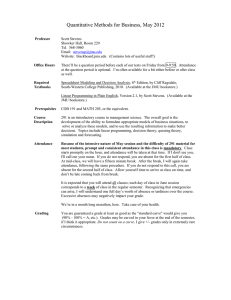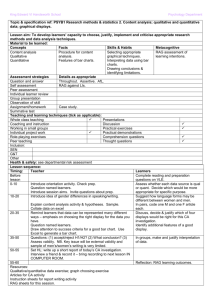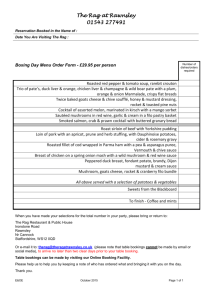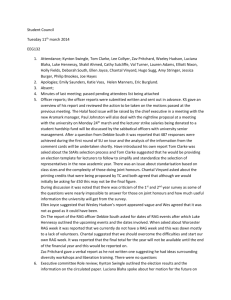IDS 291 - College of Business
advertisement
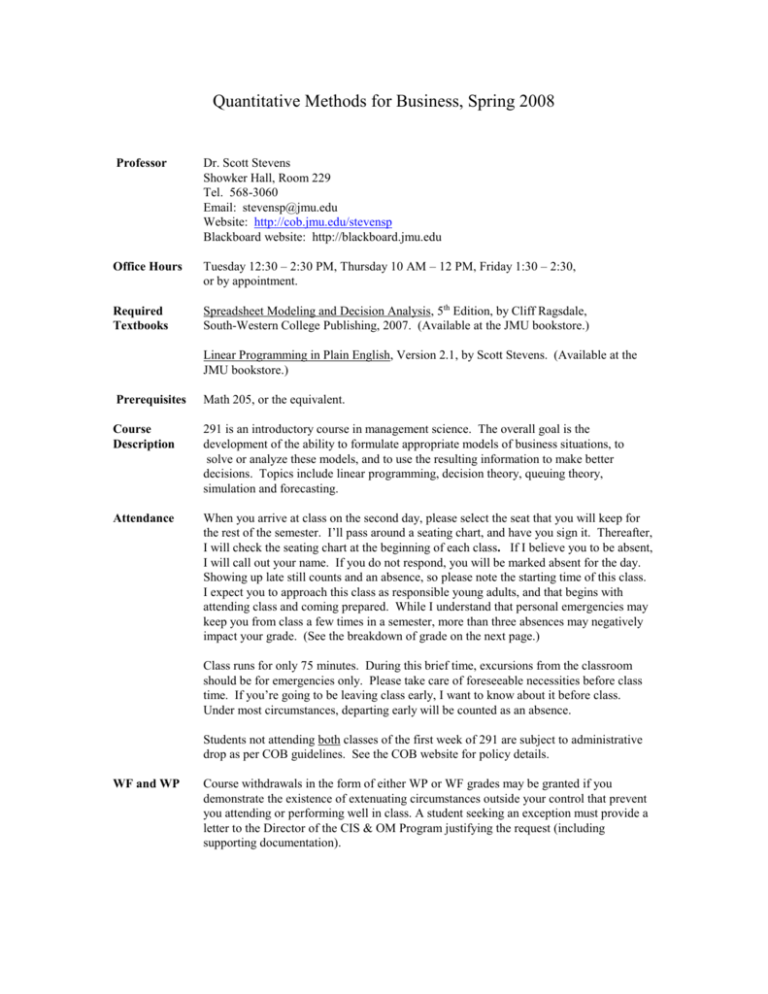
Quantitative Methods for Business, Spring 2008 Professor Dr. Scott Stevens Showker Hall, Room 229 Tel. 568-3060 Email: stevensp@jmu.edu Website: http://cob.jmu.edu/stevensp Blackboard website: http://blackboard.jmu.edu Office Hours Tuesday 12:30 – 2:30 PM, Thursday 10 AM – 12 PM, Friday 1:30 – 2:30, or by appointment. Required Textbooks Spreadsheet Modeling and Decision Analysis, 5th Edition, by Cliff Ragsdale, South-Western College Publishing, 2007. (Available at the JMU bookstore.) Linear Programming in Plain English, Version 2.1, by Scott Stevens. (Available at the JMU bookstore.) Prerequisites Math 205, or the equivalent. Course Description 291 is an introductory course in management science. The overall goal is the development of the ability to formulate appropriate models of business situations, to solve or analyze these models, and to use the resulting information to make better decisions. Topics include linear programming, decision theory, queuing theory, simulation and forecasting. Attendance When you arrive at class on the second day, please select the seat that you will keep for the rest of the semester. I’ll pass around a seating chart, and have you sign it. Thereafter, I will check the seating chart at the beginning of each class. If I believe you to be absent, I will call out your name. If you do not respond, you will be marked absent for the day. Showing up late still counts and an absence, so please note the starting time of this class. I expect you to approach this class as responsible young adults, and that begins with attending class and coming prepared. While I understand that personal emergencies may keep you from class a few times in a semester, more than three absences may negatively impact your grade. (See the breakdown of grade on the next page.) Class runs for only 75 minutes. During this brief time, excursions from the classroom should be for emergencies only. Please take care of foreseeable necessities before class time. If you’re going to be leaving class early, I want to know about it before class. Under most circumstances, departing early will be counted as an absence. Students not attending both classes of the first week of 291 are subject to administrative drop as per COB guidelines. See the COB website for policy details. WF and WP Course withdrawals in the form of either WP or WF grades may be granted if you demonstrate the existence of extenuating circumstances outside your control that prevent you attending or performing well in class. A student seeking an exception must provide a letter to the Director of the CIS & OM Program justifying the request (including supporting documentation). Disabilities If you are a student with a documented disability and will be requesting accommodations in my class, please make sure you are registered with the Office of Disability Services, Wilson Hall, Room 107, 568-6705 and provide me with an Access Plan letter outlining your accommodations. I will be glad to meet with you privately during my office hours to discuss your special needs. Students who have an approved access plan from the JMU Office of Disability Services which calls for either (1) a quiet testing environment or (2) extended time on tests and examinations must present a request for testing accommodation to their instructor at least seven (7) calendar days prior to the scheduled beginning time of the test or examination. The reason for this advance notice is to provide the instructor ample time to arrange for suitable facilities. Seven days notice is required in recognition that the College of Business lacks readily available classroom and conference room space. Grading You are guaranteed a grade at least as good as the "standard curve" would give you (90% - 100% = A, etc.). Grades may be curved in your favor at the end of the semester, if I think it appropriate. I will not make a final decision on a course curve until after the final exam. Do not count on a curve. Be advised that I do not in general give +/- grades. Breakdown of Grade: Exam 1 Exam 2 Exam 3 Comprehensive Final Projects Quizzes 18% 18% 18% 24% 10% 12% Quizzes will generally be unannounced, and will be on the assigned reading, assigned homework, or material discussed in class on the previous day. Generally, these will be a single multiple choice or short answer question. These questions should be easy if you have done the assigned reading and work, paid attention in class, and reviewed your notes before returning. Quizzes are graded on a 10 point scale, and on most, you will get either a 10 (correct) or a 0 (incorrect). Occasionally, partial credit may be given. Read assignments carefully and take notes to avoid needlessly getting a 0 on a quiz. I’ll count your top 10 quiz scores and drop the rest. Bring your homework to class, as I may choose to collect a homework assignment in lieu of giving a quiz. “Projects” refer to two small projects to be done in Excel, one in each half of the course. Details will be given in class. You course grade may be modified by my subjective evaluation of your class participation. An average level of participation will leave your score unchanged. Exceptionally good or poor participation may modify your course average by up to 4%. You can help your participation evaluation by being prepared for class, asking intelligent questions, answering questions I ask, and taking an active role in the small group work assignments. Apathy, poor preparation, poor attendance, repeated tardiness and inappropriate classroom behavior can only hurt your participation evaluation. Historically, most students have not had a participation modification of their grade. ***** Note to graduating seniors, graduate students, students needing to take 300 level classes in the fall, students on academic probation, etc.: You will not be given any special consideration in the assignment of course grades. If you cannot afford to receive a poor grade in this course, make sure that you apply yourself to the degree necessary to get the grade that you desire. There are no "last week reprieves". Do you want this to be the last semester you take COB 291? If you do, here’s some free advice that I strongly advise you to take to heart. Do all assigned homework and do it on time! Quant is in many ways a "skills" course, and as with any skill, extensive practice is a necessary step in mastering it. Watching me do it or reading others’ solutions will not cut it. Expect to be spending about 8 hours a week, minimum, on quant. Do you have an appointment book? Block out the time for quant now, and treat that appointment as conscientiously as you would an appointment with a friend or professional organization. Form a study group. Think about law school, med school, or any place where people must learn a great deal of material in a limited amount of time, and you’ll find them forming study groups. If you would like to consider joining such a group and need help finding other people, see me. I can put you in contact with others who are also in your situation. From that point, you may proceed as you see fit. Understand what you are doing! The techniques developed in this course are useful and commonly used in business, but more importantly, we are helping you learn to think and analyze in new ways. Don’t shy away from what may seem hard or unnatural to you. The tests will require you to understand concepts, not just mechanically apply procedures. Be prepared for that. Tentative Syllabus for COB 291, Spring 2008 Any changes to this syllabus will be announced in class. All readings begin and end at section breaks. LPPE is Linear Programming in Plain English, Version 2.1. The problems in LPPE appear in the back of the pamphlet, and should not be confused with the review questions at the end of each chapter. (Problems are labeled with a P, review questions with an R.) You are expected to answer orally all of the Questions at the end of each chapter of LPPE. Consider this a ongoing assignment. RAG is Ragsdale’s book. RAG ONLINE refers to a replacement to Chapter 12 of the text that we will be using. Its web address is given below. The homework problems in Chapter 12 are in your real (non-online) book. Note that the chart tells you what you are supposed to do before the class in question. Always bring your homework problems to class. One may be collected in lieu of a quiz. Note that the final exam for this course is Tues., April 29th from 6-8 pm. Date BEFORE Class DO… LPPE up through page 2-24 LPPE 2.1, 2.3, 2.5, 2.8, 2.13 Skim RAG Chapter 3 examples for LPPE 2.2, 2.4, 2.6, 2.7, 2.9, 2.14, 2.15 inspiration. Ignore Excel for now. Jan 16 LPPE 3-1 to 3-11 LPPE 2.11,2.14 and RAG 3.38 Jan 21 Martin Luther King, Jr. Day—No classes Jan 23 LPPE 3-11 to 3-15 LPPE 3.1 to 3.11 Jan 28 LPPE 4-1 to 4-4 Catch up on homework Jan 30 Exam 1: LP Formulation, Graphical Solution, Slack Feb 4 LPPE 4 -5 to 4-9 LPPE 4.1 to 4.4 Feb 6 LPPE 4-10 to 4-17, skim RAG LPPE 4.5 to 4.10. (Problem 4.10 is especially Chapter 3 for Excel info, especially important. DO IT!) Fig 3.16 Feb 11 Review, Catch-up LPPE 4.11 to 4.16. (All used later!!!) Feb 13 LPPE 5-1 to 5-14 LPPE 5.1, 5.4. Feb 18 LPPE 5-15 to 5-25 LPPE 5.3, 5.5, 5.6, 5.7, 5.8 Feb 20 First project due. LPPE 6-1 to 6-11 LPPE 5.9, 5.10, 5.11, 5.12 Feb 25 LPPE 6.2, 6.3. (6.1 is optional.) Review readings, notes, and P 4.10 Feb 27 Exam 2: LPs in Excel, Integer Programming, Sensitivity Analysis Mar 3 – 7 Spring Break: No classes Mar 10 LPPE 7-1 to 7-12 Review, correct, and rework homework. Mar 12 LPPE 7-13 to 7-25, RAG sections LPPE P D.1 15.0 to 15.5, 15.9, 15.11 Mar 17 RAG sections 15.8, 15.13, 15.14 LPPE P D.2 to P D.5 Mar 19 Review LPPE 7 LPPE P D.6 to P D.8 Mar 24 Review RAG material and LPPE 7 LPPE P D.9, P D.10 Mar 26 RAG sections 13.0 to 13.4 RAG 13.2, 13.6, 13.7 Mar 31 RAG sections 13.5-13.12, skip 13.8 RAG 13.8, 13.14, 13.17 Note: All Chapter 12 readings come from the ONLINE version of Chapter 12 using Excel only, available at http://www.swlearning.com/quant/ragsdale/fourth_edition/ragsdale.html. The problems from Ragsdale are from your BOOK. April 2 RAG ONLINE sections 12.0 to 12.7 RAG 13.9, 13.18 (note 1 day = 0.2 week) (skip 12.5.2) April 7 Exam 3: Exp. Values, Probability, Decision Theory, Basic Queuing formlulate only! Jan 9 Jan 14 BEFORE Class read… April 9 April 14 April 16 April 21 RAG ONLINE sections 12.8 to 12.11 Catch-up, work on Project RAG sections 11.0 to 11.8 RAG sec 11.10, 11.15 and 11.16, 11.18, 11.19 April 23 Catch up, rework Final Exam: Cumulative, with focus on LPPE S.1 and S.2 (by hand), S.3 (in Excel) RAG 12.8 (use Excel), LPPE P S.4 (in Excel) RAG 12.15ab (use Excel), P S.5 (either way) RAG 11.4 to 11.6 RAG 11.8, 11.10a-d, 11.15 Queuing, Simulation, and Forecasting Tuesday, April 29th, 6 - 8 PM DO NOT make vacation or travel plans that conflict with the final examination time. You will not be permitted to take the final early.
